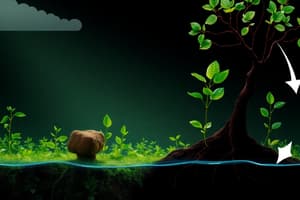Podcast
Questions and Answers
What is the primary role of plants in the carbon cycle?
What is the primary role of plants in the carbon cycle?
- Break down organic molecules into carbon dioxide
- Release carbon dioxide into the atmosphere
- Convert carbon dioxide into organic molecules through photosynthesis (correct)
- Absorb sunlight for energy
Which process is responsible for releasing CO2 back into the atmosphere?
Which process is responsible for releasing CO2 back into the atmosphere?
- Photosynthesis
- Respiration (correct)
- Human Activities
- Geological Processes
How do slow geological processes contribute to the carbon cycle?
How do slow geological processes contribute to the carbon cycle?
- By absorbing excess CO2 from the atmosphere
- By converting organic molecules into carbon dioxide
- By promoting photosynthesis in plants
- By forming sedimentary rocks and fossil fuels (correct)
In the fast carbon cycle, what is the focus of carbon exchange?
In the fast carbon cycle, what is the focus of carbon exchange?
How do human activities impact atmospheric CO2 levels?
How do human activities impact atmospheric CO2 levels?
Which organisms absorb carbon dioxide from the atmosphere to form organic molecules?
Which organisms absorb carbon dioxide from the atmosphere to form organic molecules?
Study Notes
Carbon Cycle: How Carbon Travels Through Earth's Ecosystems and Climate
The carbon cycle is a fundamental aspect of Earth's ecosystems, as it describes the continuous movement of carbon atoms between the atmosphere, ocean, and living organisms. This dynamic process is essential for maintaining a stable climate and carbon balance on Earth.
Key Components of the Carbon Cycle
-
Photosynthesis: Plants, including phytoplankton in the ocean, absorb carbon dioxide (CO2) from the atmosphere through photosynthesis. They use this carbon to form organic molecules, which are then used by other organisms in food chains.
-
Respiration: Living organisms release CO2 back into the atmosphere through respiration, where it is absorbed by plants and phytoplankton for further use in photosynthesis.
-
Geological Processes: Over long timescales, slow geological processes, such as the formation of sedimentary rock and fossil fuels, contribute to the carbon cycle.
-
Human Activities: Human activities, such as burning fossil fuels and deforestation, increase atmospheric CO2 levels, affecting Earth's climate and oceans.
Fast Carbon Cycle
The fast carbon cycle, also known as the biologic carbon cycle, is the rapid exchange of carbon among living organisms. This cycle is responsible for the short-term cycling of carbon within ecosystems.
Slow Carbon Cycle
The slow carbon cycle, also known as the geologic carbon cycle, involves the long-term cycling of carbon through geological processes. This cycle is responsible for the slow movement of carbon through the Earth's crust, taking a few hundred thousand years to rebalance.
Human Impact on the Carbon Cycle
Human activities have significantly impacted the carbon cycle, leading to an increase in atmospheric CO2 levels. Burning fossil fuels, changing land use, and using limestone to make concrete all contribute to this increase. As a result, the amount of CO2 in the atmosphere is now greater than at any time in the last 3.6 million years, causing global climate change, ocean acidification, and ecosystem disruptions.
Studying That Suits You
Use AI to generate personalized quizzes and flashcards to suit your learning preferences.
Description
Explore the intricate process of the carbon cycle, which involves the movement of carbon atoms through Earth's ecosystems, impacting climate stability. Learn about key components like photosynthesis, respiration, geological processes, and human activities affecting atmospheric CO2 levels.




